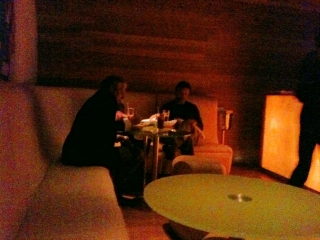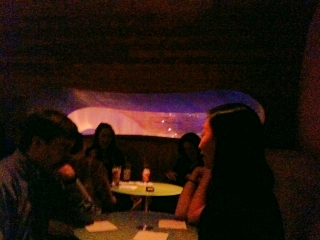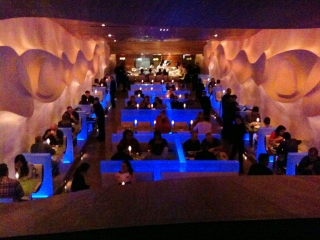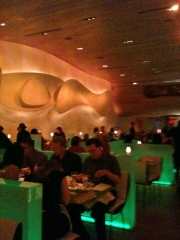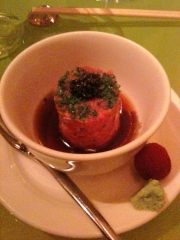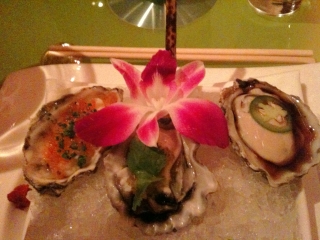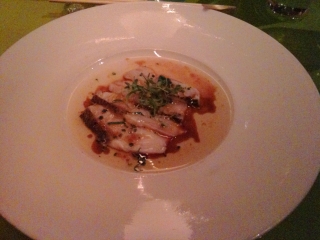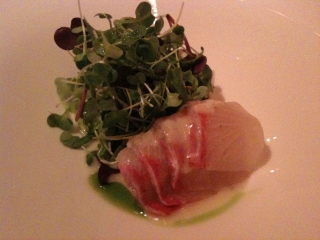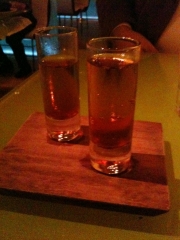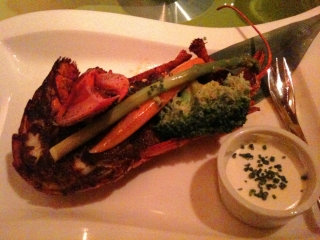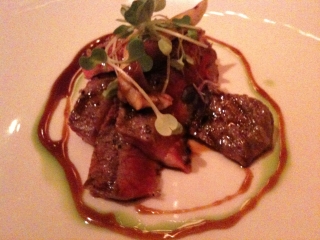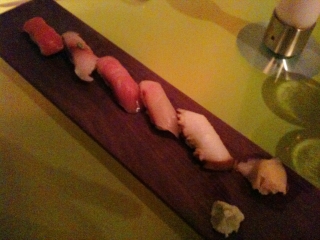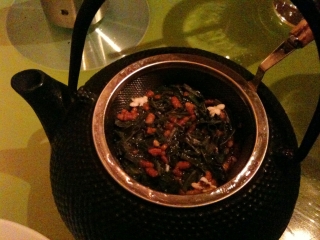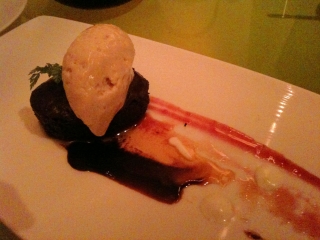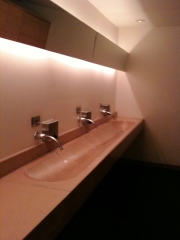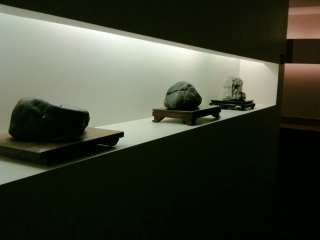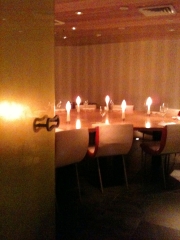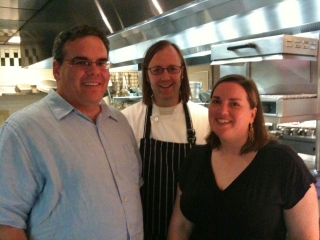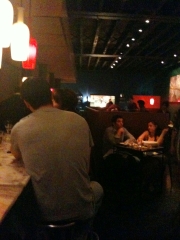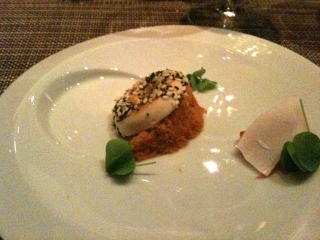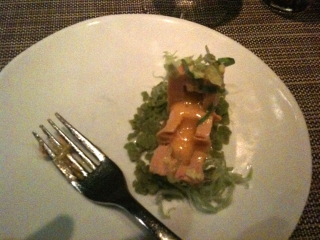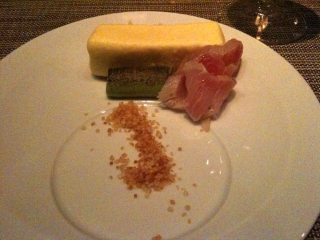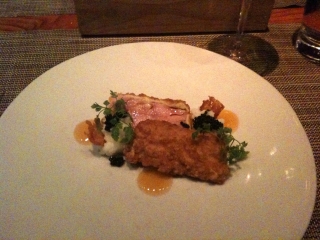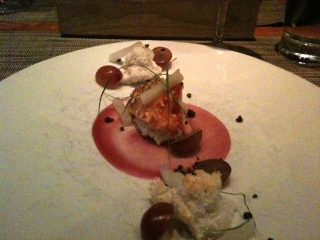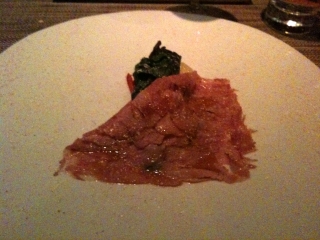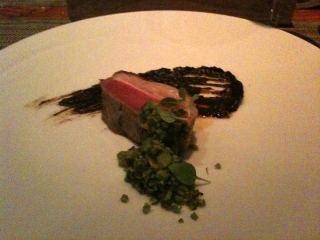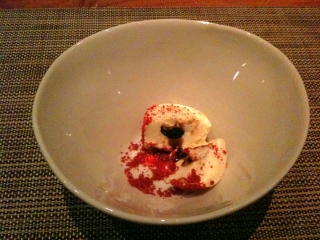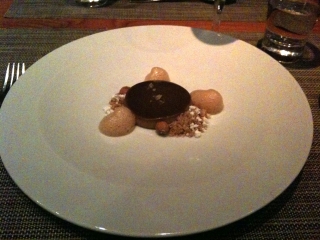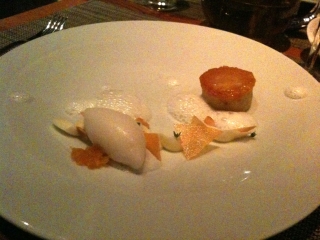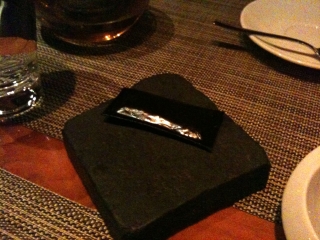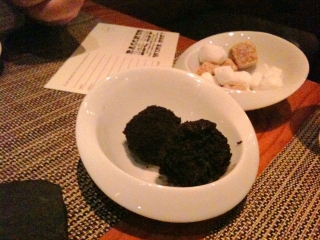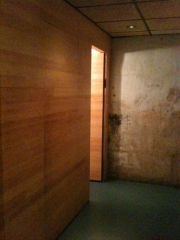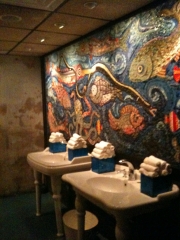Morimoto in Philadelphia. The original. The restaurant showcase for Iron Chef Masaharu Morimoto is a sleek outpost in the city of cheese steak. Not that Philly doesn’t have good food, but from the moment you walk up to Morimoto’s curved white facade you know you’ve into something different.
Philadelphia itself is a bit different from most large cities. It has a distinct feel of community. The number of local small businesses is noticeable. The central market area is an actual market with butchers and fish mongers with small restaurants rather than being exclusive to fast food eateries like in Boston. It started to make sense why Morimoto opened here rather than two hours north in New York City. And the rent is probably cheaper, too.
We were first seated in the lounge, a small darkened room on the second floor. It had a short menu of house drinks, both alcoholic and non, long bench seating and hip little squishy stools. Maybe too hip as Doug’s stool slowly lowered to the floor under his less then trendy weight. Fortunately, the wait was short.
Actually, we went in thinking we would not get the tasting menu, or omakase, presumably the Japanese word for “chef’s choice.” The regular menu looked really good. An appetizer and entree would have been fine, but then your sitting there; the room very clean, very Japanese, slowly changing color (literally). Then there is the thought, “When are we going to be back in Philadelphia?”
The omakase comes in two flavors: $80 and $120. The less expensive one seemed sufficient, but then there is the discussion. “What’s the difference? Oh, the good one has Kobe beef. Is is really Kobe? Right. American Kobe. So it’s Wagyu? Is it good Wagyu? Fine, just get us the pricey one.”
The first course was Toro Tartare. More than just ground tuna, it was a scrumptious mixture of flavors with something slightly crunchy mixed in. With caviar on top and a lychee berry served on the side, this was one of our favorites. It had a good amount of fat in the dish, making it rich and flavorful. This is a characteristic shown in many of Morimoto’s recipes and shows why the man is a genius: take healthy Japanese food and add fat. It just doesn’t get any better.
The second course was our least favorite. Forgetting the magic equation of grind fish add fat, we got three perfect raw oysters each topped with something to flavor them. The one with ginger was okay, but the spicy one and bitter one were way too strong. If this were Iron Chef battle oyster, the only comment would have been, “I couldn’t taste the oyster.” On a positive note, the flavors were good and different from anything we’d tasted on an oyster before.
The third course was Whitefish Carpaccio. The raw whitefish was thinly sliced and drizzled with hot oil. Back to the magic. Simple and tasty.
The fourth course was Yellowtail Sashimi. The raw fish was plated on top of a vinagrette next to a small pile of microgreens. Again simple but a step above raw fish alone with out overpowering the fish.
Before the fifth course, we received a pallet cleansing shot of something neither of us can remember what it was. It was subtle with maybe sake and ginger, but kind of pointless since the next dish was the most intensely flavored of the night. Half a small lobster, spiced and grilled with whipped creme fraiche on the side. Perfectly cooked, this blew the doors off your average boiled lobster with drawn butter.
Sixth up, the Waygu Beef. Seared quickly and served sashimi style, it was what it should be: rich, tender, and flavorful. This was the good stuff.
The final entree of nigiri sushi was a bit of a curiosity. Pretty standard fair, it was what you’d expect from a Japanese restaurant, kind of like a band’s big hit from the ’80s played as the encore. It’s a guilty pleasure, but you know that’s what you came for. You were not going to leave without it and bam! Thank you Philadelphia, here’s your sushi!
All joking aside, the piece of tuna on the plate was otoro. Not just fatty tuna, this is the stuff that makes depleting the seas of tuna in spite of the ecological impact on future generations all worthwhile.
We were offered tea, one option being the intriguing green tea with popcorn. It tasted like, well, popcorn. But liquid.
Of course you have to have dessert. A mini chocolate cake on raspberry puree with hazelnut mousse-like topping. As Ruth points out, it is always the right answer to end with chocolate.
Obligatory shots of the bathroom. Clean and minimalistic.
Also in the basement is the private dining room.
So? Worth it?
Absolutely. Morimoto served up some of the best food human beings get to eat. Compared to other tasting menus they are a bargain. While the service is very good, they are a bit of a volume business. They were able to do eight courses in two hours. We certainly were not rushed, but the place is busy.
It should be noted that this was one of the few dinners we had without wine. They offered a drink pairing, but we declined in part in because of a bias about the cuisine (the Japanese are not big on wine), but mostly because we had more than our share the night before. Everything in moderation.
